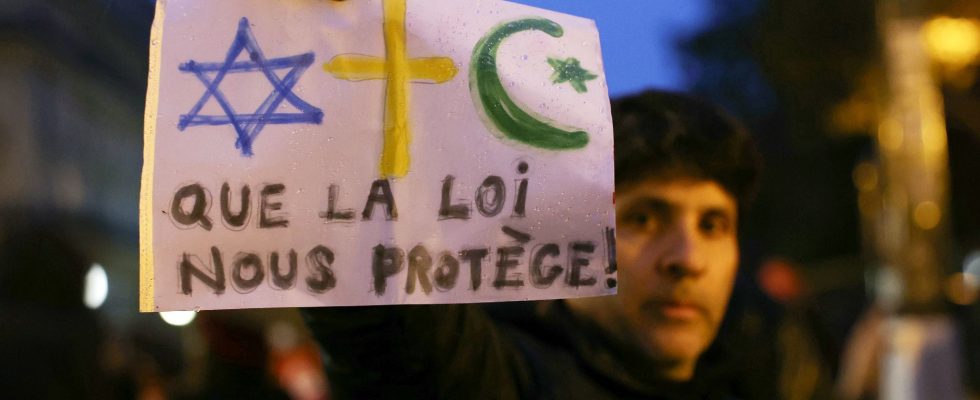“The objective [d’Emmanuel Macron de montrer une France “unie derrière ses valeurs et son universalisme”] seems to have been reached, observes the Italian daily La Stampa (center, liberal). Today is the largest mobilization against anti-Semitism ever seen on the other side of the Alps since the protest march against the desecration of a Jewish cemetery in Carpentras in 1990, and many speak of a ‘historic day ‘.”
Although a large police force had been deployed, no accident had been reported at the end of the day. “Another reason for satisfaction”, concludes the Italian title.
The fear of living in France as a Jew
The Swiss daily The weather (liberal) describes the atmosphere of the procession as “serious”. “There were just a few rare students carrying signs against fascism,” the newspaper said. “These demonstrators probably represented the majority of French people, a silent majority, in the first sense of the term.”
The fear of French people of Jewish faith of living in their own country comes up like a leitmotif in the writings of several foreign journalists. “All along the route, between the Esplanade des Invalides and the Luxembourg Gardens, we hear testimonies of Jews who now padlock the garden gate and we talk about friends and acquaintances who hide Jewish symbols so as not to be landmarks”, notes the Spanish daily El País (center-left).
For the New York Times (center-left), the historian of anti-Semitism in France Marc Knobel notes that “500,000 French people of Jewish faith are afraid in their own country, and it is absolutely terrifying”. According to the American newspaper, “France has also not experienced major clashes between pro-Palestinian students and Jewish students in universities, as is the case in the United States. However, anti-Semitic acts have been reported on French campuses and Jewish students reported an atmosphere of growing hostility.”
A divided France and a changing political landscape
In Spain, El País continues by painting the portrait of a divided France. “The demonstration leaves a photo of France, or of a certain France. The one who takes to the streets against anti-Semitism is not exactly the same as the one who takes to the streets during pro-Palestinian demonstrations.”
The presence of the National Rally also caused the Spanish daily to react, for which “perhaps this Sunday will be remembered as the day when the extreme right entered the Republican majority consensus, from which it was excluded until recently “.
Other media were surprised by the presence of Marine Le Pen at the march as well as the absence of Jean-Luc Mélenchon, the leader of rebellious France. “A few years ago, it would have been unthinkable for a far-left party not to participate in a march against anti-Semitism”, and “inadmissible for a far-right party to be present there”, the BBC is surprised.
“The participation of the National Rally is nevertheless a new blow of demonization [du parti]even if the obvious proximity with the Jewish community stems above all from their antipathy towards the Muslim community”, summarizes the german daily South German Zeitung (liberal).
